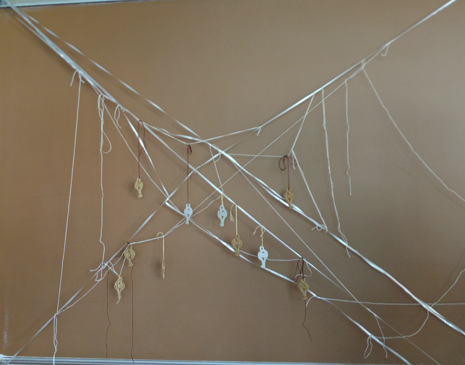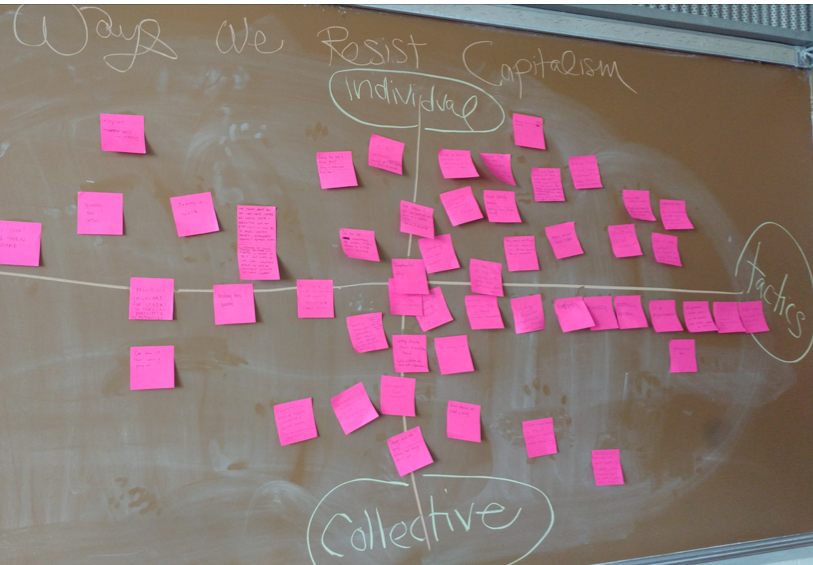I had the pleasure and honor of getting to present at the 20th Allied Media Conference last weekend. Given that it’s one of the most brilliant, transformative, and badass spaces in the US, I knew it was going to be amazing and an opportunity to soak in experiences of how we can co-create a world we WANT to live in.
The AMC is one of those conferences where it’s so stacked, there is no way to engage with even a fraction of all the offerings you’d like to, so this reportback is certainly not comprehensive coverage!
This is a meditation on one theme I picked up on at the AMC: collective self-determination for a more just world.
A few key ideas shared at the AMC on this topic are:
Timebanking: Instead of trading time for money, trade time for time. One hour of your baking time, one hour of their painting time, one hour of my consulting time. All equal one hour. Here’s a neat timebanking open source software used around the world: http://hourworld.org/_TimeAndTalents.htm
Non-extractive economies: instead of profit, resource mining, and taketaketake colonialist thinking, focus on sustainability and maintenance. More recently used conceptually, and in opposition to extractive economies – banking (taking interest), removal of non-renewable resources (coal, minerals). This interview can give you more context. http://www.lifteconomy.com/blog/2017/8/30/ed-whitfield-racial-justice-meets-non-extractive-financing
Zero-growth economies: Similarly to non-extractive economics, what if there was no incentive to profit? What if having what we need in the present while preparing for an awesome future was the point? What if instead of pocketing debt earnings, companies paid workers more? This macroeconomic analysis digs in. https://www.sciencedirect.com/science/article/pii/S0921800917306869
Democratic workplaces: Where participants (workers) have meaningful decision-making power in their work and work lives. Often associated with worker-owned cooperatives but expanding into other workplaces as it becomes ever more obvious that sticking people into cog-like work slots and expecting lock-step compliance doesn’t work out. People are smart and have good ideas – hey, wow what an idea!
In the hacking capitalism workshop I presented, we collectively created the “web” of capitalism.
I had us use white thread to indicate the underlying colonization that created an extractive model of capitalism – and in doing so, we revealed the ad hoc way our economic system was constructed. We can SEE the holes in the web.

Here’s the thing: humans built the current economy. (Mostly white humans of a certain gender and class, but human-created nonetheless.) How our economy is set up is not a god-given universalism, it’s not an absolute truth that each of us must move ever more towards while scraping every last damn cell of value off the earth and from each other while returning as little as possible. We built it, and we can change it.
Then we added icons of resistance to visualize how they impacted the web.
Key to the input from the room in the session was interdependence – we struggled to think of things we could do to generate resilience within our economic system individually that didn’t have some kind of collective impact or outcome.

Lots of the ideas were deeply collective: share food, share homes, manage work, support each other. These are still the basics of getting more out of less, pals.
One of the things that makes the AMC so rad is that its design is deeply informed by young people, folks of color, and disabled folks: marginalized experiences are centered. That means accessibility, BIPOC artists and thought, and youth organizing is everywhere — and THAT, my friends, means an inclusive and interconnected worldview is at the center. The lens through which all the other thinking about a better future and justice, including economic justice, is focused on bringing IN more voices, ideas, and wisdom.
Interdependence IS the future.
Given that the current present was created by old ideas and exclusionary thinking, this is fuckin critical.
Old ways of thinking ended up creating the US as a nationstate that enacts violence on asylum-seeking families and the environment; systems to redline and imprison, and oh basically everyone who’s not wealthy encounters debt and mediocre healthcare (as just a few examples).
One tool shared at the conference that acknowledges injustice and give people an opportunity to contribute is Appolition, an app that will help you contribute to bail funds in an ongoing way, by connecting to your bank account and rounding up to the dollar your purchases, taking the extra few cents. Plus it’s Black-lead and coded by an all-Black team of technologists! I am fixing to sign up once the new version is released later this month.
We all need and deserve better, and replicating old models ain’t gonna get us better. The AMC crew has produced a ton of great thinking about using science fiction as a model for change, and emergent strategy as an operating principle.
The general atmosphere is one of change in action, of living out better ways to build a future.
I’m really excited about the ways people are building towards and thinking about how we will create and have the things of life in the future: our next economy.
To that end, my favorite thing I saw at the AMC was an introduction to the Equitable Internet Initiative, an expansive project that resulted in community-owned mesh networks delivering free/affordable wifi internet to homes that hadn’t had internet access.
In Detroit, 40% of houses haven’t been wired to get internet. Imagine if 2 out of 5 of your neighbors had no internet at home, and then imagine their kids trying to do homework or them looking for a job [or trying to start a business] without internet. Yeah, it’s a justice issue.
These networks are administered by a team of Digital Stewards – younger folks who got IT training. Next, each neighborhood’s team is getting coaching to create a worker-owned business to affordably serve internet AND create self-determined jobs AND provide digital resilience to neighborhoods. This is the future, and it’s rad.
Working together resiliently IS the future.
Our future isn’t going to be post-needs: we’ll still want internet, stuff, and maintenance for our stuff. The question is “how can we do this together, in a way that doesn’t cause harm?”
In the words of Arundhati Roy, “Another world is not only possible, she’s on the way and, on a quiet day, if you listen very carefully you can hear her breathe.”
I heard her breathing, y’all. She lives.
